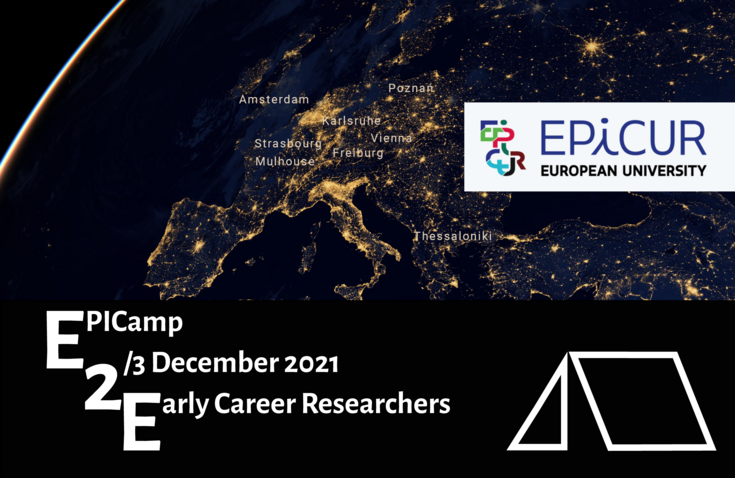EPICamp II
"Sustainability, Material Use and Climate Justice"
A global sustainability transition from a socio-metabolic perspective integrating land-use, material use, energy transition, climate justice, and ecosystem impact.
On 2/3 December, 2021 EPICUR organises its second EPICamp. Organised by BOKU and the University of Freiburg, the research camp is primarily aimed at early career researchers.
Here you can find the program for the two days.
Application deadline for participation: 1 December, 2021

What is this EPICamp about?
In order to tackle the climate crisis and to enable a sustainability transformation, we need to recognize planetary boundaries and adapt our demand accordingly while considering intra- and intergenerational justice. A sustainability transition is required, away from fossil fuel use towards a circular bioeconomy, where limited resources such as land and raw materials are used carefully and in a way that intra- and intergenerational justice at multiple social and spatial scales is assured. The resulting societies, and their production and consumption patterns, are envisioned to rest on renewable resources (biomass, wind, solar, hydro, etc.) and on non-renewables (like metals or sand) that are used only in a circular manner and within planetary boundaries. But this transition entails changed resource requirements potentially resulting in new sustainability concerns regarding the expected additional pressure on land ecosystems (for biomass production as well as surface area for conservation or infrastructure etc.) which are already in competition with provisioning for agricultural, forestry, infrastructural, and settlement needs, as well as competing with challenges of biodiversity conservation and human well-being more broadly. Questions arise not only about how such a transition can be achieved, but also which justice implications are entailed to different societal groups.
Traditionally, large scale transformation scenario modelling has paid little attention to equity and justice questions at the national and, in particular, the sub-national scale. Here, strong commitments to rapidly curb greenhouse gas emissions by transitioning to a decarbonized economy meet with local efforts to address the impacts of climate change. Consequently, climate action needs to be tackled in accordance with resource use (energy, materials, land) and socio-economic drivers accounting for regionally and internationally specific justice concerns.
Keywords and sub-themes
• Social metabolism as key to understand the material and energy underpinnings of sustainability
• Land-use changes within planetary boundaries that support a bioeconomy
• Climate change and climate justice: inter- and intragenerational perspectives
• Material wealth, services, sufficiency, and equity
• Ecosystem impact of human activities incl. climate change
• Energy and sustainability transitions
• Trade and teleconnections in the course of sustainability transformations
• Sustainable agriculture and forestry, incl. agroforestry
• Afforestation and Reforestation of marginal lands
• The role of agriculture and forestry combating climate change
• Supporting biodiversity conservation and 'non-material' human well-being in context of conflicting demands on land
Submissions and Participation
EPICUR invites scholars, NGOs including public institutions, institutes, social organizations, funding agencies, infrastructure providers (such as archives, libraries, museums etc.), business etc. to come together and share their insights, concerns, needs and vision for the future. ALL applications, regardless of the manner of participation, have to be submitted through this form. We highly encourage you to fill out all relevant sections with care, as matchmaking and networking events will be based on these responses. Please note that the EPICamp will take place online. Applications must be submitted November 15, 2021 for due consideration, with the exception of the third option registration, which will be considered until November 25, 2021. You can contact the EPICUR organizing team for all questions.
Three options for participation
1) PARTICIPATION WITH THEMATIC CONTRIBUTION: you may submit a proposal for one of the following potential formats. As EPICamps are non-traditional gatherings, so are potential submissions. We invite prospective participants to apply with innovative and creative formats as well as submissions that are more traditional in format but aim for inter- and/or transdisciplinary exchange. Applicants may choose one of the following proposed formats or add their own:
-
Panel Discussions: full panels with around 23 ⁄ early career and 13 ⁄ senior researchers may be submitted as well as open panels, which will be filled on the go
-
Posters introducing current research as well as research ideas
-
Short-Thesis Presentations (5min) this is primarily aimed at late-stage PhD researchers or recent graduates who wish to continue their research in the coming years
-
Open Discussion Groups / Special Target Discussion Groups: please submit topic/theme along with at least three discussion questions, indicating your intended target group (disciplines; career stages etc.)
-
Workshops & Skill Presentations: please submit a short paragraph outlining the particular topic/method/skill you wish to address in a mini-workshop
-
Interventions (i.e., everything beyond traditional formats, e.g., short performances, slams, movies, book presentations etc.
2) PARTICIPATION WITH ORGANISATIONAL CONTRIBUTION: you can offer to moderate a format (open discussion), facilitate group interactions, or report on sessions in which you participated. Applicants will receive their assignments and guidelines from the organizing team.
3) PARTICIPATION AS AN ACTIVE ATTENDEE: you can also simply join the EPICamp as a participant actively listening and contributing to the discussions and networking activities.
EPICUR is an alliance dedicated to the values of equity, diversity, and inclusion and aims to provide a space that is welcoming and encouraging to all scholars, particularly those, which have been traditionally underrepresented in academic environments. We, therefore, welcome all suggestions and ideas that help us make this event as inclusive and useful to the EPICURean community of researchers as possible, with special regard paid to the need of early career researchers. Please do not hesitate to get in touch with us at any point before, during or after the EPICamp.

